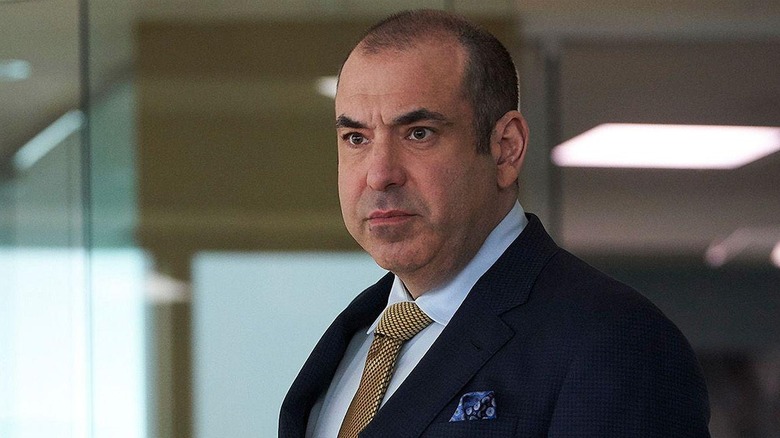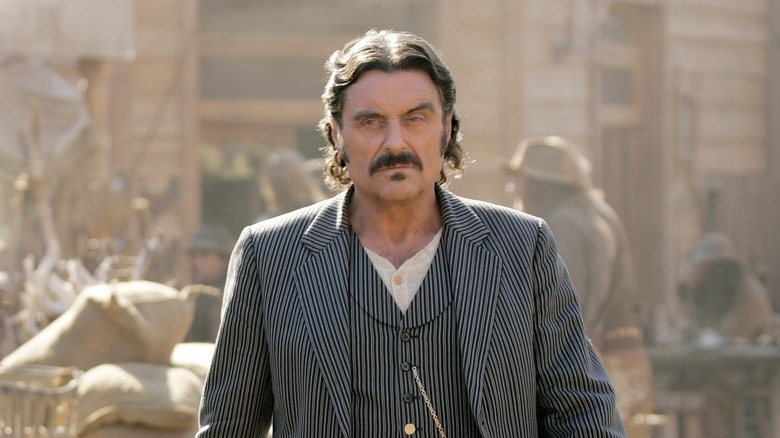One Of Suits' Most Interesting Character Arcs Was Lifted Directly From Deadwood
"Suits" creator Aaron Korsh pulled from his own life when crafting the show, which enjoyed success during its USA Network first run and has been blitzing Netflix this year.
In an interview with Nerdist back in 2014 (when "Suits" was in season 4), Korsh detailed some of his inspirations. He cited a scene in the pilot, where Pearson Hardman junior partner Louis Litt (Rick Hoffman) fires an associate in front of newly-hired protagonist Mike Ross (Patrick J. Adams). It turns out that this "associate" was a) actually a mailroom worker, b) in on the act, and c) not truthfully fired. Louis does this trick to put the fear of God (or at least the Sword of Damocles) in the firm's new employees. Korsh got this character-building moment from a fraternity trick back in his college days at the University of Pennsylvania:
"I had a roommate that went to a fraternity. And he pledged and he came home one night and he was like, "Oh my god. One guy refused to do a shot and they yelled at him and they kicked him out right there on the spot." And he was petrified. And it turns out that guy was a plant. He was like a sophomore, not a freshman, and they do that every year to make the pledges realize if they don't do what they're told, they could get dropped."
Korsh didn't limit his influences to his offscreen life, though. Calling himself "a huge 'Deadwood' fan," his intention with Louis' arc — starting as a source of hatred and then softening — was modeled on Al Swearengen (Ian McShane). "Deadwood," created by David Milch and airing for three seasons on HBO from 2004 to 2006, was set in the eponymous South Dakota settlement during the 1870s. Swearengen was based on a real-life 19th-century crime boss and owner of Deadwood's saloon/brothel, the Gem.
Deadwood's Al Swearengen
Like any good Western, "Deadwood" used the community as a microcosm for America itself (easy comparisons can be made to John Ford's "My Darling Clementine"). However, most of the sparring between the characters was them firing off words, not bullets. Milch's poetic and loquacious dialogue created a show that sounded more at home in the Royal Shakespeare Company (albeit with HBO's trademark pepperings of "f**k" and "c***sucker"). None took better to Milch's dialogue than McShane, who wrapped his tongue around Swearengen's profane insults and musings with the ease of breathing.
It was impossible to dislike Swearengen — even when "Deadwood" gave you plenty of reason too. Al is initially set up as the show's villain (as Korsh notes, he tries to have a little girl killed in season 1) while gun-toting, cowboy-hatted lawman Seth Bullock (Timothy Olyphant) is the hero. Then they come to an understanding at the end of season 1, essentially partnering to keep order in Deadwood and protect it from outside interests. Al's tongue never loses its sharpness, but his ruthlessness gradually gets pointed towards more and more deserving targets as layers peel back to show a softer (but not plain soft) side, especially with his favored employee Trixie (Paula Malcomson). Tellingly, the follow-up "Deadwood" movie (released in 2019) closes with Al, not Bullock, confirming who the real center of this story was.
Korsh told Nerdist, "I didn't think that Louis was as evil as Al Swearengen, nor does he maybe become as beloved as Al Swearengen," (corporate lawyer versus murderous pimp — can either one really cast the first stone?). Still, he feels that Louis earns sympathy due to his humor and vulnerability, much like Swearengen does.
"Suits" is streaming on Netflix and Peacock. "Deadwood" is streaming on Max.

